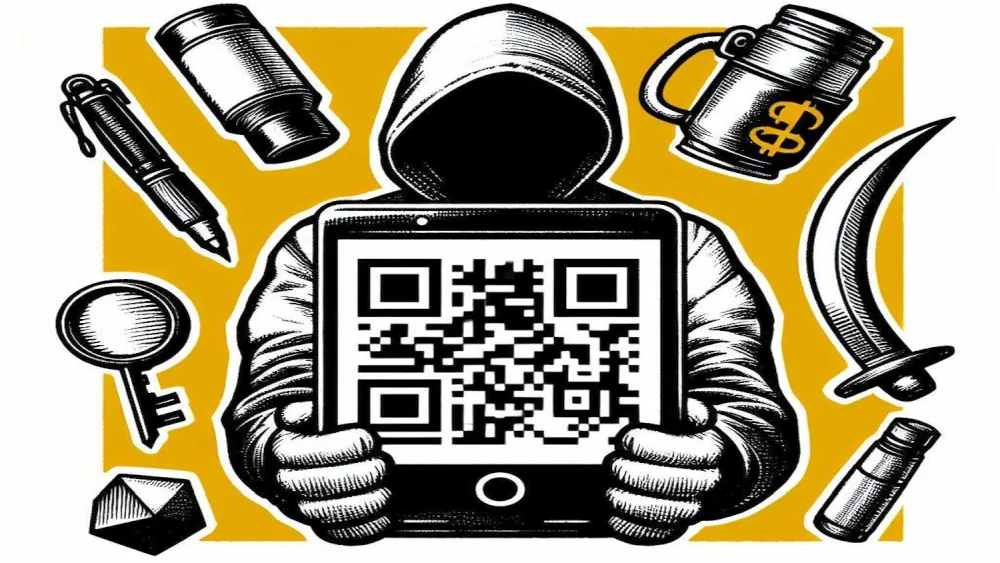 illustration: bing.com/create
illustration: bing.com/createIn an age of ubiquitous QR codes, cybercriminals have devised a new way to deceive internet users - quishing. This type of attack uses QR codes to redirect users to fake websites, where personal data may be stolen or devices infected with malware.
How Does Quishing Work?
Criminals generate QR codes that look identical to real ones. They then place these codes in public places, such as sidewalks, lamp posts, or bulletin boards, or send them in emails or SMS messages. These codes may lead to fake banking sites, social media portals, reward pages, or other popular services.
After scanning the QR code, the user is redirected to a page that looks identical to the original. Scammers often use social engineering techniques to persuade victims to provide login details, credit card numbers, or other confidential information.
What Are the Threats Associated with Quishing?
As reported recently by Bankier.pl, there are no official statistics on quishing attacks in Poland. However, the threat is rising, as evidenced by warnings from the Ministry of Digitization, the Financial Supervision Authority, and CERT. A new vector of attack includes counterfeit QR code stickers on parking meters.
According to analysts at Keepnet Labs, quishing will be one of the most serious threats to businesses and individuals in 2024. In 2023, the number of data or money theft cases using this method increased globally by 587%.
Quishing can lead to serious consequences for victims, including:
- Theft of personal data: Scammers may use victims` personal information for identity theft, financial fraud, or other crimes.
- Financial loss: Victims may lose money from their bank accounts or credit cards.
- Device infection with malware: Fake websites may contain malware that can damage devices or steal data.
- Loss of reputation: In cases of identity theft, victims may have difficulties obtaining credit or employment.
How to Protect Yourself from Quishing?
To protect yourself from quishing, exercise caution when scanning QR codes:
- Never scan QR codes from unknown sources: Do not scan QR codes placed in public locations or received in emails or SMS from unknown senders.
- Carefully check the QR code: Before scanning, closely inspect the QR code. Look for any spelling errors or discrepancies in the URL.
- Use a QR code scanning app with authenticity checking: Some apps can verify whether a QR code is authentic.
Never provide personal data on websites after scanning a QR code, even if the site looks identical to the original. Also, remember to regularly update your antivirus software.
COMMERCIAL BREAK
New articles in section Law in media
Ai in disinformation. Operation Matryoshka and personalization of fakes
Anna Mikołajczyk-Kłębek
The increasing use of artificial intelligence to generate false content and profiled disinformation are trends that will shape the disinformation landscape in the coming years, according to Dr. Wojciech Kotowicz, an expert from the University of Warmia and Mazury (UWM) in Olsztyn, Poland.
Dietary supplement ads in Poland. Who keeps influencers in check?
Newseria, KFi
One in three Polish internet users considers influencer recommendations when deciding on medicines and dietary supplements. Although promotion of such products is regulated, there are still cases of advertising that skirt the law.
SEO Poisoning. Hackers Use Search Engines to Target Businesses
Piotr Rozmiarek
Search engines help us quickly find information, but they can also be used by cybercriminals. SEO poisoning is a tactic where attackers manipulate search engine rankings to place harmful websites at the top of search results.
See articles on a similar topic:
Local Media in Poland - Corrections
Bartłomiej Dwornik
The regulations regarding corrections are perhaps the most frequently violated rule in Polish media. There is a clear division between those who never admit to mistakes and those who can humbly accept their faults.
Local Media in Poland - The Press Owner Influence
Bartłomiej Dwornik
The editor-in-chief, according to the provisions of the Press Law, should be responsible for the content of the materials prepared by the editorial team as well as for the editorial and financial matters of the editorial office. This is the theory.
How #MeToo Changed Journalism. Report by Reporters Without Borders
Krzysztof Fiedorek
The #MeToo movement has turned the media world upside down, creating new spaces to fight for women’s rights and confronting journalists with challenges they hadn’t previously faced. From new editorial roles to increasing cyberbullying threats, journalism is undergoing a revolution, and feminist media is gaining strength to openly address violence and discrimination.
Quishing. How to Protect Yourself from QR Code Scams
Krzysztof Fiedorek
According to analysts from Keepnet Labs, quishing will be one of the most serious threats to businesses and individuals in 2024. In 2023, the number of data or money theft cases using this method increased globally by 587%.





























